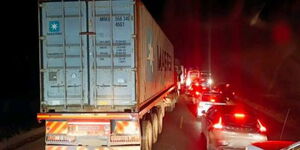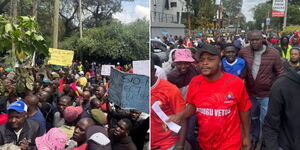From a humble beginning in 1997 as a subsidiary of Telkom Kenya to converting into a public company in 2002, Safaricom has been nothing short of a spectacle.
Safaricom has grown from a voice and data service provider, to the biggest communication company in East and Central Africa providing financial services and enterprise solutions to the subscribers.
At the heart of the company's legacy has been the drive to address everyday problems and offer solutions through the over 100 products under its portfolio.
Top of this list is M-PESA, the pioneer mobile money transfer globally and the most successful of its kind which has won the company's awards and accolades globally.
Since its launch in March 2007, M-PESA has a registered customers base of over 23 million.
As part of its social responsibility, the company has sponsored the Safaricom Marathon in Lewa since its inauguration in July 2000.
The Marathon endeavours in environmental conservation of some of the World's most endangered species such as the Mountain Bongo and the Northern Rhinos.
Its a course that saw the company win the Total Eco Challenge Awards in 2005 for planting an estimated 1M trees - the highest number by a Corporate in the year.
However, the progress of a journey is best marked by milestones and affordability of services is a notable one at Safaricom.
For instance, in the late 90's, a new SIM card retailed at Ksh2,500 which was slashed down to just Ksh99.
The telecommunication company has lowered the denomination of its scratch card in the market to Ksh10 which was made even better with the launch of Sambaza (airtime-sharing) in 2005.
The solution provision model has seen the customer base increase from the 17,000 customers inherited from Telkom to over 25.1 million users in 2016.
The launching of Mobile Internet in 2004 equally marked a new chapter for many Kenyans and Safaricom has stamped its market leadership in the sector with the fastest and most reliable internet coverage.
As part of giving to the society that has made Safaricom a brand to reckon, the company has invested in title sponsorship of annual rugby sevens (Safaricom Sevens), addressed road safety through Toa Sauti – a partnership with NTSA, and fundraising in times of calamities including famine.
Safaricom's dedication to transforming lives was evident as early as 2002 when the company covered the entire Mombasa - Nairobi Highway with its network to ease communication for travellers.
To cushion its customers from the global cybercrime threat, the company has introduced a variety of features including voice biometrics.
In 2017, Safaricom enhanced M-Pesa for visually impaired clients in a bid to embrace all its customers.
Moreover, to support youth and talent, Safaricom has further invested in several initiatives including Chapa Dimba, and Blaze Youth empowerment and sponsorship of marathons across the country.
Besides, Safaricom has helped in building classrooms and libraries in many parts of the country as well as providing high speed internet.
The company's social responsiveness to social plight has also been marked by numerous free medical camps in various regions across the country.
In 2017 when the government implemented the ban on plastic bags, Safaricom equally was among the first cooperates to support this by switching to reusable eco-friendly bags.
Its wide range of innovations have supported e-commerce and the growth of Small and Medium Enterprises (SMEs), Agri-tech, young scientists and supporting musicians through Skiza tunes.
All these noble acts have seen Safaricom make a remarkable impact in the Kenyan economy amounting to Ksh413 billion in 2016 and creating over 840,000 jobs.
It has been a wonderful 18 years of life-changing transformation but more importantly that portend a more exciting future.












